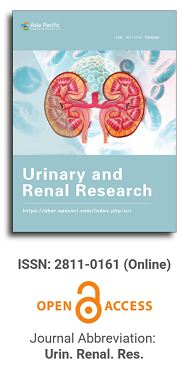
Asia Pacific Academy of Science Pte. Ltd. (APACSCI) specializes in international journal publishing. APACSCI adopts the open access publishing model and provides an important communication bridge for academic groups whose interest fields include engineering, technology, medicine, computer, mathematics, agriculture and forestry, and environment.
Effects of alprostadil combined with levocarnitine on renal function and inf1ammatory factors in patients with ESDN
Vol 3, Issue 2, 2022
Download PDF
Abstract
Objective To explore the effects of alprostadil combined with levocarnitine on renal function and serum levels of toll⁃like receptor⁃4 (TLR⁃4), interleukin⁃18 (IL⁃18) and tumor necrosis factor⁃α (TNF⁃α) in patients with end ⁃ stage diabetic nephropathy (ESDN). Methods 88 cases of patients with ESDN admitted between January 2015 and January 2018 were divided into observation group (n=44) and control group (n=44) Alprostadil was applied to both groups, and the observation group was combined with levocarnitine. renal function [serum creatinine (SCr), urea nitrogen (BUN), glomerular filtration rate (eGFR)], inflammatory factors (TLR⁃4, IL⁃18, TNF-α) and blood biochemical indicators [hemoglobin(Hb), serum albumin(ALB), cholesterol(TC)] were evaluated before treatment and after 4 weeks of treatment. The incidence rate of dialysis adverse reactions was recorded in the 2 groups. After 4 weeks of treatment, the levels of SCr and BUN in the 2 groups were lower than those before treatment (P<0.05), and the decrease in observation group was greater than that in control group (P<0.05). There was no significant difference in the eGFR within⁃groups before and after treatment and between groups(P>0.05). After 4 weeks of treatment, the levels of TLR⁃4, IL⁃18 and TNF⁃α in the 2 groups were lower than those before treatment (P<0.05), and the decrease in observation group was greater than that in control group (P<0.05). After 4 weeks of treatment, the levels of Hb and ALB in the 2 groups were higher than those before treatment (P<0.05) while the TC level in the 2 groups was lower than that before treatment (P<0.05), and the changes in observation group were greater than those in control group ( P<0.05 ). The incidence rate of adverse reactions in observation group was lower than in control group (P<0.05 ). Conclusions Alprostadil combined with levocarnitine is beneficial to reduce the levels of inflammatory factors, protect patients' renal function, Alprostadil combined with levocarnitine is beneficial to reduce the levels of inflammatory factors, protect patients' renal function, and reduce the risk of adverse reactions.
Keywords
References
- Chen Guoguang. Comprehensive evaluation of peritoneal dialysis for end-stage diabetic nephropathy[J]. China Drugs and Clinics, 2016, 16(7):1022⁃1023.
- Bi Yan. Current status of epidemiological studies on chronic complications of diabetes mellitus in China[J]. Chinese Journal of Diabetes, 2015, 7(8):467⁃469.
- Yuan JH, Wang WB. Clinical analysis and prognosis comparison between peritoneal dialysis and hemodialysis patients with ESDN [J]. China Miscellaneous Chinese and Western Medicine Combined Nephrology
- Journal, 2016, 17(9):821⁃823.
- Huang YY, Wang X, Zhang YL, et al. Research progress of microinflammation and malnutrition in diabetic nephropathy[J]. Journal of Modern Integrative Medicine, 2018, 27(11):1247⁃1249.
- Jiang B, Wang XF, Jiang H, et al. The value of levocanidine assisted with different hemodialysis modalities in end-stage diabetic nephropathy[J]. Journal of Liberation Army Medicine, 2016, 28(b10):47⁃49.
- Wang T, Wang SQ, Wang DH, et al. Effects of leucovorin therapy on T lymphocyte subsets and soluble interleukin 2 receptors in patients on maintenance hemodialysis for end-stage renal disease[J]. China Chronic Disease Prevention and Control, 2016, 24(won "tongue-logged__2):144⁃146.
- Liu XS. Effect of levocanidine on protein energy expenditure in non-dialysis patients with chronic renal failure[J]. Chinese Journal of Integrated Chinese and Western Medicine and Nephrology, 2016, 17(4):340⁃341.
- Zhao JM, Zhu SH, Mou AH. Effects of hemoperfusion combined with hemodialysis and levocanidine on anemia and calcium-phosphorus metabolism and inflammatory factors in patients with chronic renal failure[J]. China Clinical Research, 2018, 31(7):914⁃917.
- Tong GY, Zhu DL. Interpretation of domestic and international clinical guidelines and expert consensus on diabetic nephropathy[J]. Chinese Journal of Practical Internal Medicine, 2017, 37(3):211⁃216.
- Zhang Qian, Tian Fengsheng. Research progress on the relationship between changes in coagulation function and cardiovascular disease in diabetic nephropathy[J]. Journal of Microcirculation, 2016, 26(1):69⁃71.
Supporting Agencies
Copyright (c) 2022 Changyan Li, Juan Liu, Fang Gu, Chaolei Xiong

This work is licensed under a Creative Commons Attribution-NonCommercial 4.0 International License.

This site is licensed under a Creative Commons Attribution 4.0 International License (CC BY 4.0).
.png)
Prof. Wei-Yen Hsu
National Chung Cheng University, Taiwan

